初中中考英语知识点考点总结(全)
中考英语知识点全汇总
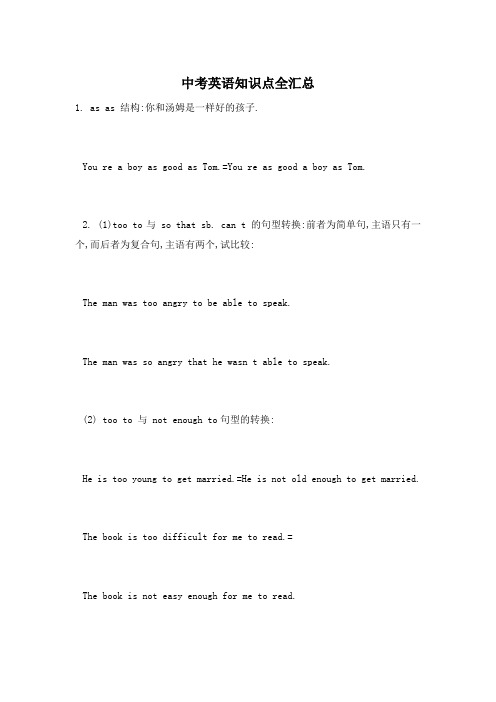
中考英语知识点全汇总1. as as 结构:你和汤姆是一样好的孩子.You re a boy as good as Tom.=You re as good a boy as Tom.2. (1)too to与 so that sb. can t 的句型转换:前者为简单句,主语只有一个,而后者为复合句,主语有两个,试比较:The man was too angry to be able to speak.The man was so angry that he wasn t able to speak.(2) too to 与 not enough to句型的转换:He is too young to get married.=He is not old enough to get married.The book is too difficult for me to read.=The book is not easy enough for me to read.3. 形容词原级表示比较级含义:约翰不象迈克那么苯.John is not so stupid as Mike.John is less stupid than Mike.John is cleverer than Mike.4. 用比较级表示最高级:约翰是班里最高的男生.John is taller than any other boy in the class.John is the tallest boy in the class.5. the more .. the more .表示越越 :The more books you read, the wider your knowledge is.The more food you eat, the fatter you are.6. more and more .表示越来越 :More and more students realized the importance of a foreign language. Our country is getting stronger and stronger.二.中考考点词组1. after, in 这两个介词都可以表示 (时间)以后的意思after 以过去为起点,表示过去一段时间之后,常用于过去时态的句子中?如:She went after three days. 她是三天以后走的in 以现在为起点,表将来一段时间以后,常用于将来时态的句子中如:She will go in three days. 她三天以后要走2. how long, how often, how soonhow long指多长时间,主要用来对一段时间(如three days, four weeks 等)提问?如:How long ago was it? 这是多久前的事了?how often指每隔多久,主要用来对频率副词或状语(如once a week等)提问?如: How often does he come here? Once a month. 他(每隔)多久来一次?每月一次.how soon指再过多久,主要用来对表示将来的一段时间(in an hour, in two weeks 等)提问?如:How soon can you come? 你多快能赶来?3. few, a few, little, a little, several, somefew 和little的意思是否定的,表示很少或几乎没有而a few和a little 的意思是肯定的,表示有一些,有一点儿few 和 a few修饰可数名词;little 和 a little 修饰不可数名词several用于修饰可数名词,语意比a few和some更肯定,含有好几个的意思some可修饰可数名词,也可修饰不可数名词,从数量上说,它有时相当于a few 或 a little,有时指更多一些的数量4. the other, anotherthe other 指两个人或事物中的另一个 ,表示特指?如:We stood on one side of the road and they stood on the other. 我们站在街这边,他们站在那边another着重于不定数目中的另外一个 ,表示泛指,所以常用来指至少三个中的一个?如:She has taken another of my books. 她已经拿了我的另外一本书5. spend, take, cost, payspend的宾语通常是时间?金钱?在主动语态中,句子的主语必须是人,而且后面不能用动词不定式做它的宾语?如:She spent the whole evening in reading. 她把整个晚上用来读书take常常用来指花费时间,句子的主语通常是表示事物的词语?如:How long will this job take you?你做这项工作要花多长时间?cost 指花费时间?金钱或力气等,只能用表示事物的词做主语,并且不能用于被动语态?如:How much does the jacket cost?这件夹克多少钱?pay 主要指主语(某人)买某物(或为某事)付多少钱(给某人)?如:I pay for my rooms by month. 我按月支付租金6. among, betweenbetween 的意思是在中间,在之间 ,一般指在两者之间?如:There is a table between two windows. 在两扇窗户之间有一张桌子.between 有时也表示在多于两个以上的事物之间,但那是指在每二者之间.如:the relationship between different provinces and municiplities 省市和省市之间的关系(这里是指每两个省市之间的相互关系?)7. beat, win这两个词都有获胜,打败的意思,但其后宾语不同?beat是打败,优于的意思,后面接人或队?如:We beat them. 我们打败了他们.win指赢,获胜 ,后面接比赛?名次?如:We won the match/game/race/the first place. 我们赢了这场比赛(获得了第一名).8. agree with, agree on, agree toagree on表示就取得一致意见 ?如:We all agree on (making) an early start. 我们一致同意及早出发?agree with表示与意见一致 ,后面既可以跟表示人的名词或人称代词,也可以跟表示意见.看法的名词或what引导的从句?.如:I agree with you without reservation.我毫无保留地同意你的意见.We agree with what you said just now.我们同意你刚才所说的意见.agree to后面不能接人,只能接提议,计划,方案等词句?如:I agree to the terms proposed. 我同意拟议的条件.9. bring, take, carry,fetch这四个词都是动词,都含有带或拿的意思,但使用的场合各不相同.bring作带来,拿来解?如:Ne_t time don t forget to bring me a copy of your work. 下次不要忘了把一份你的作品带给我.take是bring的对语,作带去,拿去解?如:Take the bo_ away, please. 请把盒子拿走.carry表示运载,携带之意,运送的方式很多,可以用车.船,也可以用手甚至用头.如:This bus is licensed to carry 1_ passengers. 这辆巴士准载一百人.fetch则表示去拿来的意思.如:Please fetch me the uments in that room. 请到那间房间去把文件拿来给我._. each, every两词都是每个的意思,但着重点不同.each着重个别的情况,every着重全体,有所有的的意思.如:She knows each student of the class.她认识这个班里的每一个学生.She knows every student of the class.她认识这个班所有的学生._. no one, noneno one指没有人(只能指人,不能用来指物) ,意思与nobody相同,作主语时不必跟of连用,如:No one believes him since he is not honest. 没有人相信他,因为他不诚实.No one else but I went. 除我以外,谁也没去.none指一个也没有(既可指人,也可指物) ,作主语时代替不可数名词,谓语动词用单数形式;代替可数名词,谓语动词用单.复数都可以.但在主+系+表结构中,如果表语为复数,则系动词要用复数形式.如:None of us are(is) afraid of difficulties. 我们谁也不怕困难._. go on doing, go on to do, go on with这三个动词短语都有继续做某事的意思,其区别如下:go on doing表示继续做,一直在做某事(中间无间断) go on to do表示接着做某事 ,即某事已做完,接着做另一件事;go on with也表示继续做某事 ,其含义是某一动作一度中止后,又继续下去._. too much, much too二者都有太,非常之意,much too为副词词组,修饰形容词?副词,不可修饰动词.如:It s much too cold.天气实在是太冷了.too much作太多讲,有以下三种用法?(1)作名词词组如:You have given us too much. 你给我们的太多了.(2)作形容词词组修饰不可数名词如:Don t drink toomuch wine. 不要饮太多的酒(3)作副词词组修饰不及物动词如:She talks too much. 她说话太多_. happen, take place与occurhappen有偶然的意思,多用于客观事物?情况的发生?.如:Whatever has happened to your arm? It s all swollen. 你的手臂怎么了?肿得好历害!occur 指有计划地使某些事发生 ,有时强调呈现于人的知觉中.如:Did it occur to you to phone them about it?你难道没想到就这事给他们打个电话?事件作主语时,happen和occur可以通用?如:The accident happened/occurred yesterday. 事故是昨天发生的.take place 指事件发生,但常用来表示举行的意思,带有非偶然性?例如:The meeting took place last night.会议昨晚举行._. in front of, in the front ofin front of的意思是在前面 .如:There is a tree in front of the house.房子前面有一棵树.in the front of的意思是在前部 ,指在某个空间范围内的前面.如:There is a blackboard in the front of the classroom. 教室里前部有一块黑板_. noise, voice, sound这三个词都作声音解,在表示听到声音这个意思时,三者可以通用,但它们又各有特定的含义.sound 作声音解,含义最广,指可以听到的任何声音,如:a weak sound 微弱的声noise作噪音,嘈杂声,吵闹声解,指不悦耳,不和谐的声音,它既可作可数名词,也可作不可数名词.如:Another kind of pollution is noise. 另外一种污染是噪音.voice 作声音解时,多指人发出的声音,包括说话声.歌声和笑声.如:He shouted at the top of voice. 他高声呼喊.有时也用于引申意义,作意见.发言权解.如:I have no voice in the matter. 对于这件事,我没有发言权._. arrive, get, reach三者均可表示到达 ,arrive后通常接介词at(一般用于较小的地方)或 in(一般用于较大的地方)?如:We arrived at the station five minutes late. 我们晚了5分钟到车站?又如:They will arrive in Paris ne_t Monday. 他们将于下周星期一到达巴黎?get之后通常接介词to.如:When we got to the park, it began to rain. 我们到达公园时,就开始下雨了.reach是及物动词(较 get更正式),其后可直接跟地点名词做宾语(不能用介词).如:He reached Beijing yesterday. 他昨天到达北京.三.情态动词1.考查情态动词表示推测的用法[考点快忆] 表示肯定推测的情态动词有:must 一定;准是 ,may 也许;可能 ,might 或许表示否定推测的情态动词有:can t 不可能 , couldn t 不会 ,may not 也许不 ,might not 或许不 can表示推测时不用于肯定句,may表示推测时不用于疑问句.2.考查情态动词引起的一般疑问句的答语[考点快忆] 回答must时,肯定答语用must,否定答语用needn t或don t have to.回答need时,肯定答语用must,否定答语用needn t.回答may时,肯定答语用may,否定答语用mustn t 或can t.3.考查情态动词的意义[考点快忆] must 必须 have to 不得不 need 必须;需要 can(could) 能;可能 may (might) 可以;可能 shall,will (would) 将;会;愿意;要 should 应当 .had better (not) + 动词原形表示建议;have to / has to / had to的否定,疑问形式要借助于助动词do / does / did.四. There be 的句子结构There be是一个存在句型,表示有的意思,肯定句的形式为:There be + 名词(单数或复数)+地点状语或时间状语.be动词单复数的确定,看be后边第一个名词,当所接主语为单数或不可数名词时,be动词形式为is;当所接主语为复数名词时,be动词为are;当be动词后接两个以上主语时,be动词与最临近主语保持数上的一致.意思为某地有某人或某物 .如:There is an eraser and two pens on the desk. 桌子上有一块橡皮和两支钢笔.There are two pens and an eraser on the desk. 桌上有两支钢笔和一块橡皮.(1)there be的否定句,即在be的后面加上not.否定形式为:There be + not + (any) + 名词+地点状语.There is not any cat in the room. 房间里没猫.There aren t any books on the desk. 桌子上没书.(2)there be句型的疑问句就是将be提到句首:Be there + (any) +名词+地点状语肯定回答:Yes, there is / are. 否定回答:No, there isn t / aren t. -Is there a dog in the picture?画上有一只狗吗-Yes, there is. 有.-Are there any boats in the river?河里有船吗-No, there aren t. 没有.(3)特殊疑问句:How many . . . are there (+地点状语)某地有多少人或物回答用There be . . .There s one. / There are two / three / some . . .有时直接就用数字来回答.One. / Two . . .-How many students are there in the classroom?教室里有多少学生-There s only one. / There are nine. 只有一个./有九个.(4)如果名词是不可数名词,用:How much + 不可数名词 + is there + 地点状语How much water is there in the cup?杯中有多少水五. 中考对定语从句的考查:1.定语从句的功用和结构在复合句中,修饰某一名词或代词的从句叫做定语从句.被定从句修饰的词叫做先行词.定语从句必须放在先行词之后.引导定语从句的关联词有关系代词和关系副词.例如:This is the present that he gave me for my birthday2.关系代词和关系副词的功用关系代词和关系副词用来引导定于从句,在先行词和定语从句之间起纽带作用,使二者联系起来.关系代词和关系副词又在定语从句中充当一个成分.关系待客做主语,宾语,定语,关系副词可作状语.1. 作主语:关系代词在定语从句中作主语时,从句的谓语动词的人称和数须和先行词一致.例如:I don t like people who talk much but do little.The cars which are produced in Hubei Province sell very well.2. 作宾语:She is the person that I met at the school gate yesterday.The book that my grandmother gave me is called The Great Escape .3. 作定语关系代词whose在定语从句中作定语用.例如:What s the name of the young man whose sister is a tor?The girl whose father is a teacher studies very hard.4. 作状语I ll never forget the day when I first came to Beijing.三. 各个关系代词和关系副词的具体用法1. who 指人,在定语从句中作主语.例如:The person who broke the window must pay for it.The boy who is wearing the black jacket is very clever.2. whom指人,在定语从句中作宾语.例如:Do you know the young man (whom) we met at the gate?Mr Lee (whom) you want to see has come.3. whose 指人,在定语从句中作定语.例如:The girl whose mother is ill is staying at home today.I know the boy whose father is a professor.4. which指物,在定语从中作主语或宾语.例如:A dictionary is a book which gives the meaning of words.Here is the book (which) the teacher mentioned yesterday.5. that多指物,有时也指人,在定语从句中作主语或宾语.例如:I ve read the newspaper that(which) carries the important news. Who is the person that is reading the newspaper over there?6. when 指时间,在定语从句中作状语.例如:I ll never forget the time when we worked on the farm.He arrived in Beijing on the day when I left.7. where 指地点,在定语从句中作状语.例如:This is the house where we lived last year.The factory where his father works is in the east of the city.四. 关系代词 whom, which 在定语从句中作介词宾语时,可以和介词一起放于先行词与定语从句之间,有时为了关系紧凑也可以将 whom 与 which 与先行词紧挨着书写,而将介词置于定语从句的后面,如:That was the room in which we had lived for ten years. = That was the roomwhich we had lived in for ten years.五. 具体使用时还要注意下列问题:1. 只能使用that,不用which 的情况:(1) 先行词是all, few, little, nothing, everything, anything 等不定代词时.例如:All that he said is true.(2) 先行词被only, no, any, all,等词修饰时.例如:He is the only foreigner that has been to that place.(3) 先行词是序数词或被序数词修饰的词.例如:He was the second (person) that told me the secret.(4) 先行词是形容词最高级或被形容词最高级修饰的词.This is the best book (that) I have read this year.(5) 先行词既包括人又包括物时.例如:He talked about the people and the things he remembered.2. 只能用which,不用that 的情况:(1) 在非限制性定语从中.例如:The meeting was put off, which was e_actly what we wanted.(2) 定语从句由介词+关系代词引导,先行词是物时.例如:The thing about which he is talking is of great importance.。
中考英语重要知识点总结
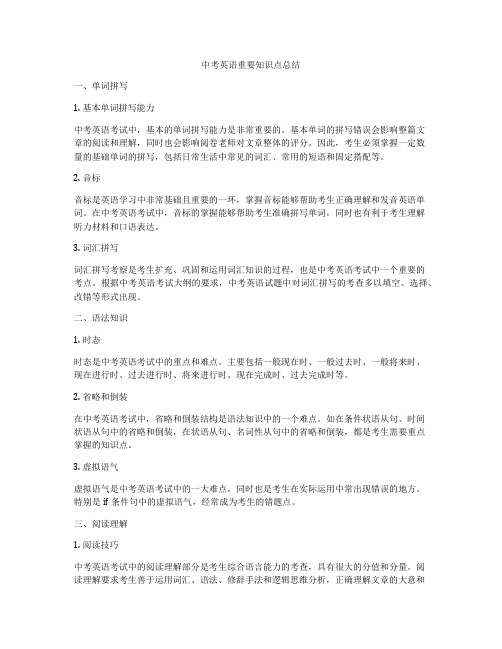
中考英语重要知识点总结一、单词拼写1. 基本单词拼写能力中考英语考试中,基本的单词拼写能力是非常重要的。
基本单词的拼写错误会影响整篇文章的阅读和理解,同时也会影响阅卷老师对文章整体的评分。
因此,考生必须掌握一定数量的基础单词的拼写,包括日常生活中常见的词汇、常用的短语和固定搭配等。
2. 音标音标是英语学习中非常基础且重要的一环,掌握音标能够帮助考生正确理解和发音英语单词。
在中考英语考试中,音标的掌握能够帮助考生准确拼写单词,同时也有利于考生理解听力材料和口语表达。
3. 词汇拼写词汇拼写考察是考生扩充、巩固和运用词汇知识的过程,也是中考英语考试中一个重要的考点。
根据中考英语考试大纲的要求,中考英语试题中对词汇拼写的考查多以填空、选择、改错等形式出现。
二、语法知识1. 时态时态是中考英语考试中的重点和难点。
主要包括一般现在时、一般过去时、一般将来时、现在进行时、过去进行时、将来进行时、现在完成时、过去完成时等。
2. 省略和倒装在中考英语考试中,省略和倒装结构是语法知识中的一个难点。
如在条件状语从句、时间状语从句中的省略和倒装,在状语从句、名词性从句中的省略和倒装,都是考生需要重点掌握的知识点。
3. 虚拟语气虚拟语气是中考英语考试中的一大难点,同时也是考生在实际运用中常出现错误的地方。
特别是if条件句中的虚拟语气,经常成为考生的错题点。
三、阅读理解1. 阅读技巧中考英语考试中的阅读理解部分是考生综合语言能力的考查,具有很大的分值和分量。
阅读理解要求考生善于运用词汇、语法、修辞手法和逻辑思维分析,正确理解文章的大意和细节,抓住文章的主题和各种细节,辨别文章的褒贬和观点,理解上下文的关系,推理出文章的逻辑,猜测词义等。
2. 阅读能力提升阅读能力的提升是考生成功通过中考英语考试的关键之一。
阅读理解部分的题目主要考查考生对英语文章的快速理解和分析能力,所以考生必须多读英语文章,提高自己的阅读量和速度。
四、写作能力1. 作文内容中考英语作文通常要求考生根据一定的题目要求进行写作,要求考生的内容要贴合主题,条理清晰,表达流畅。
人教九年级全册中考英语语法考点总结 中考必备知识点

人教九年级英语语法考点总结,中考必备知识点一. 介词by的用法1. 意为“在……旁”,“靠近”。
Some are singing and dancing under a big tree. Some are drawing by the lake.有的在大树下唱歌跳舞。
有的在湖边画画儿。
2. 意为“不迟于”,“到……时为止”。
Your son will be all right by supper time.你的儿子在晚饭前会好的。
How many English songs had you learned by the end of last term?到上个学期末你们已经学了多少首英语歌曲?3. 表示方法、手段,可译作“靠”、“用”、“凭借”、“通过”、“乘坐”等。
The monkey was hanging from the tree by his tail and laughing.猴子用尾巴吊在树上哈哈大笑。
The boy’s father was so thankful that he taught Edison how to send messages by railway telegraph. 孩子的父亲是那么的感激,于是他教爱迪生怎样通过铁路电报来传达信息。
4. 表示“逐个”,“逐批”的意思。
One by one they went past the table in the dark.他们一个一个得在黑暗中经过这张桌子。
5. 表示“根据”,“按照”的意思。
What time is it by your watch?你的表几点了?6. 和take , hold等动词连用,说明接触身体的某一部分。
I took him by the hand.我拉住了他的手。
7. 用于被动句中,表示行为主体,常译作“被”、“由”等。
English is spoken by many people.英语被许多人说。
初中英语中考考点词汇精讲(共10个)

中考英语考点词汇精讲1.grow upgrow up意为“长大;成熟;成长”。
例如:I grew up in Beijing.我是在北京长大的。
I want to be a football player when I grow up.我长大后相当一名足球运动员。
【拓展】(1)grow into意为“长大成为”。
例如:Mary grew into a beautiful girl.玛丽长成了一个漂亮的姑娘。
(2)grow还有“种植;增长”的意思。
例如:The farm grows all kinds of crops, such as rice, wheat and cotton.这个农场种植各种各样的庄稼。
例如:稻谷、小麦和棉花。
The population of the world is growing faster and faster.世界人口增加得越来越快。
2.make suremake sure=be sure,意思是“确信”,它的后面可以跟that(可省略)引导的宾语从句、动词不定式或of短语。
例如:I am sure of his guilt.我确定他有罪。
I am sure to help you tomorrow.我明天一定会帮你。
I am sure(that)he will achieve his goal.我确定他会实现目标的。
cationeducation是名词,意为“教育;教育学”。
例如:Everyone wants to have a good education.每人都想有一个良好的教育。
His lack of education is a disadvantage when he looks for a job.他缺少教育,这在找工作时是一个不利条件。
【拓展】educational是形容词,意为“教育的,有教育意义的”,常作定语。
例如:The staff should make sure the kids have an enjoyable and educational day.老师们应该确保孩子们度过愉快而有教育意义的一天。
中考考点_过去进行时知识点汇总(全)
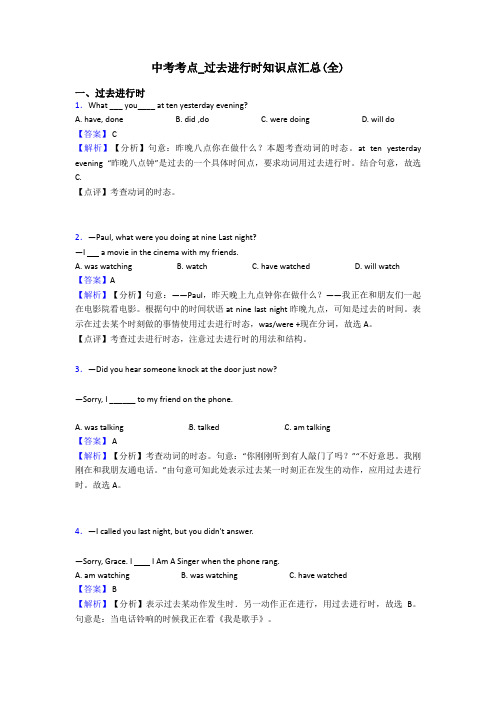
中考考点_过去进行时知识点汇总(全)一、过去进行时1.What ___ you____ at ten yesterday evening?A. have, doneB. did ,doC. were doingD. will do【答案】 C【解析】【分析】句意:昨晚八点你在做什么?本题考查动词的时态。
at ten yesterday evening “昨晚八点钟”是过去的一个具体时间点,要求动词用过去进行时。
结合句意,故选C.【点评】考查动词的时态。
2.—Paul, what were you doing at nine Last night?—I a movie in the cinema with my friends.A. was watchingB. watchC. have watchedD. will watch【答案】A【解析】【分析】句意:——Paul,昨天晚上九点钟你在做什么?——我正在和朋友们一起在电影院看电影。
根据句中的时间状语at nine last night昨晚九点,可知是过去的时间。
表示在过去某个时刻做的事情使用过去进行时态,was/were +现在分词,故选A。
【点评】考查过去进行时态,注意过去进行时的用法和结构。
3.—Did you hear someone knock at the door just now?—Sorry, I ______ to my friend on the phone.A. was talkingB. talkedC. am talking【答案】 A【解析】【分析】考查动词的时态。
句意:“你刚刚听到有人敲门了吗?”“不好意思。
我刚刚在和我朋友通电话。
”由句意可知此处表示过去某一时刻正在发生的动作,应用过去进行时。
故选A。
4.—I called you last night, but you didn't answer.—Sorry, Grace. I I Am A Singer when the phone rang.A. am watchingB. was watchingC. have watched【答案】 B【解析】【分析】表示过去某动作发生时.另一动作正在进行,用过去进行时,故选B。
初中英语中考考点大汇总
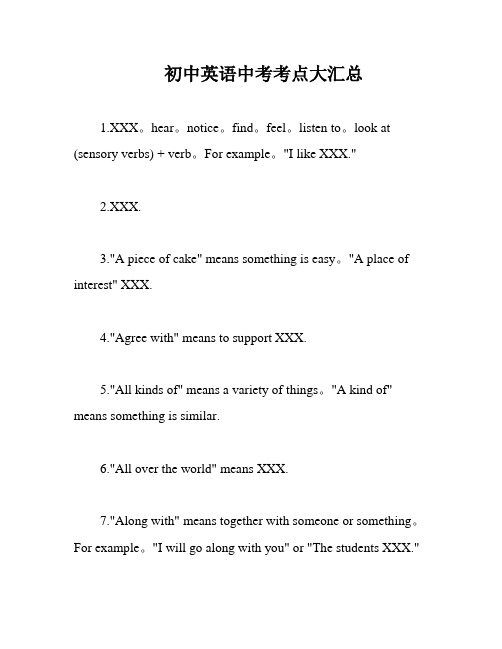
初中英语中考考点大汇总1.XXX。
hear。
notice。
find。
feel。
listen to。
look at (sensory verbs) + verb。
For example。
"I like XXX."2.XXX.3."A piece of cake" means something is easy。
"A place of interest" XXX.4."Agree with" means to support XXX.5."All kinds of" means a variety of things。
"A kind of" means something is similar.6."All over the world" means XXX.7."Along with" means together with someone or something。
For example。
"I will go along with you" or "The students XXX."8."XXX.9."As you can see" means that someone is already aware of something.10."Ask for" means to request something directly。
For example。
"Can I ask you for my book?"11."Ask someone for something" means to request something from XXX.12."Ask someone to do something" means to request that someone do something。
2023年中考英语总复习英语精华知识点全汇总建议收藏
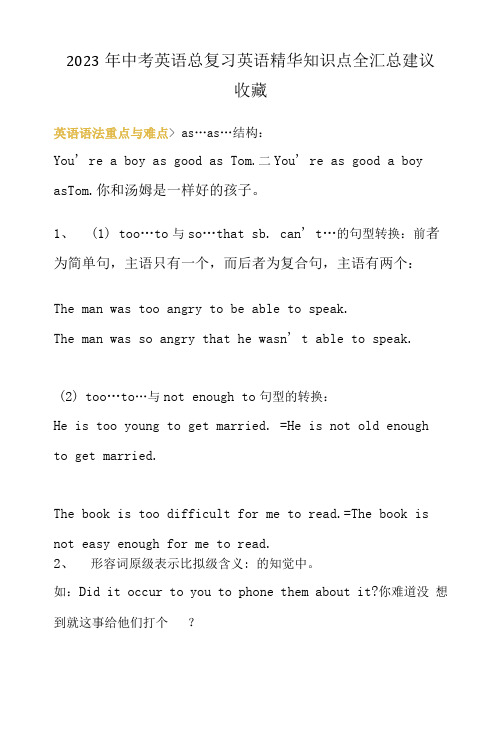
2023年中考英语总复习英语精华知识点全汇总建议收藏英语语法重点与难点> as…as…结构:You' re a boy as good as Tom.二You' re as good a boy asTom.你和汤姆是一样好的孩子。
1、(1) too…to与so…that sb. can' t…的句型转换:前者为简单句,主语只有一个,而后者为复合句,主语有两个:The man was too angry to be able to speak.The man was so angry that he wasn' t able to speak.(2)too…to…与not enough to句型的转换:He is too young to get married. =He is not old enough to get married.The book is too difficult for me to read.=The book isnot easy enough for me to read.2、形容词原级表示比拟级含义: 的知觉中。
如:Did it occur to you to phone them about it?你难道没想到就这事给他们打个?事件作主语时,happen和occur可以通用?如:The accident happened/occurred yesterday. 事故是昨天发生的。
take place指事件发生,但常用来表示“举行”的意思,带有非偶然性?如:The meeting took place last night.会议昨晚举行。
14.in front of, in the front of in front of的意思是“在前面”。
如:There is a tree in front of the house.房子前面有一棵树。
初中英语中考考点词汇精讲(共26个)

中考英语考点词汇精讲1.well&good两者都可以表示“好”的意思。
well是副词,用于修饰动词。
例如:Tom speaks Chinese well.汤姆的汉语说得好。
He sings well.他唱得好。
good是形容词,用作定语或表语。
例如:She is a good doctor.她是个好医生。
His pronunciation is very good.他的发音很好。
well作形容词时,指的是健康状况良好。
例如:He is quite well.他身体好。
I hope you will be well soon.我希望你很快好起来。
2.no&notno 表示“不”,修饰可数名词单数时no=not a; 修饰可数名词复数或者不可数名词时no=not any。
例如:I have no book.=I don’t have a book.I have no books.= I don’t have any books.There is no water in the cup.=There isn’t any water in the cup.no 常用来做否定回答,与yes相对应,not不可以。
例如:Do you like bananas? No, I don’t.不可以说Not, I don’t.not 用于否定句,放在助动词或者be动词后面表示否定,no 不可以。
例如:我们可以说I don’t like tea.不可以说I do no like tea.3.foodfood泛指“食物”,“食品”,通常用做不可数名词。
例如:I like Chinese food.我喜欢中国食品。
We should eat healthy food every day.我们每天应该吃健康食品。
food指食物的种类时是可数名词。
例如:Milk is a good food.牛奶是一种好食品。
Too many sweet foods, like cakes and pastry, may make you fat.太多的甜食,像蛋糕和点心,可能会使你发胖。
中考英语知识点归纳整理
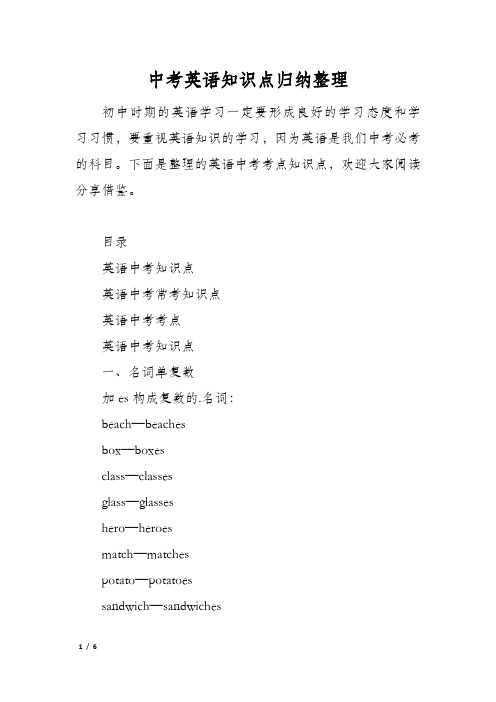
中考英语知识点归纳整理初中时期的英语学习一定要形成良好的学习态度和学习习惯,要重视英语知识的学习,因为英语是我们中考必考的科目。
下面是整理的英语中考考点知识点,欢迎大家阅读分享借鉴。
目录英语中考知识点英语中考常考知识点英语中考考点英语中考知识点一、名词单复数加es构成复数的.名词:beach—beachesbox—boxesclass—classesglass—glasseshero—heroesmatch—matchespotato—potatoessandwich—sandwichestomato—tomatoeswatch—watches将f或fe改为v加es构成复数的名词:knife—knivesleaf—leaveslife—livesshelf—shelveswife—wiveswolf—wolves复数变化不规则的名词:child—childrenChinese—chinesefireman—firemenfish—fish/fishesfoot—feetJapanese—Japaneseman—menmouse—mice policeman—policemen postman—plstmen salesman—salesmensheep—sheeptooth—teethwoman—women返回目录英语中考常考知识点被动语态被动语态由助动词be加及物动词的过去分词构成,助动词be有时态,人称和数的变化。
被动语态的时态是由be的时态决定的,be是什么时态,全句就是什么时态,be动词后面的过去分词不变。
1、各种时态的被动语态结构如下:一般现在时的被动语态:主语+am / is / are (not)+过去分词一般过去时的被动语态:主语+was / were +过去分词现在完成时的被动语态:主语+have / has +been +过去分词一般将来时的被动语态:主语+will +be +过去分词过去将来时的被动语态:主语+would / should + be +过去分词过去进行时的被动语态:主语+was / were + being +过去分词过去完成时的被动语态:主语+had + been +过去分词情态动词的被动语态:情态动词+be+过去分词2、被动语态的用法(1)不知道或没有必要说明动作的执行者是谁,不用by+动作执行者短语。
(完整word版)全初中必背英语语法知识汇总
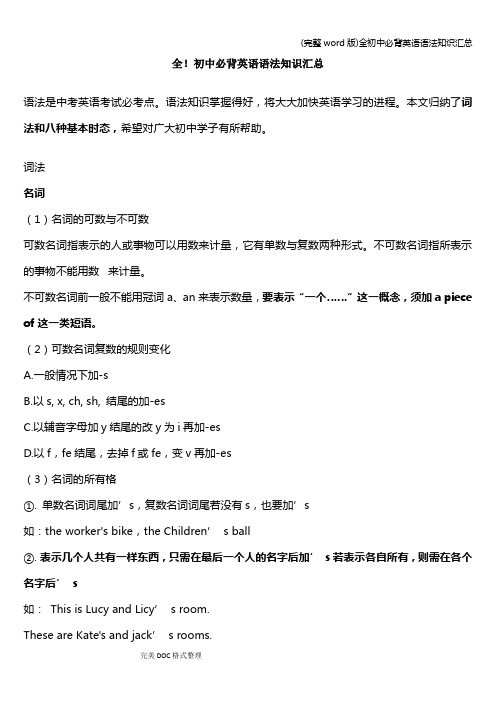
全!初中必背英语语法知识汇总语法是中考英语考试必考点。
语法知识掌握得好,将大大加快英语学习的进程。
本文归纳了词法和八种基本时态,希望对广大初中学子有所帮助。
词法名词(1)名词的可数与不可数可数名词指表示的人或事物可以用数来计量,它有单数与复数两种形式。
不可数名词指所表示的事物不能用数来计量。
不可数名词前一般不能用冠词a、an来表示数量,要表示“一个……”这一概念,须加a piece of这一类短语。
(2)可数名词复数的规则变化A.一般情况下加-sB.以s, x, ch, sh, 结尾的加-esC.以辅音字母加y结尾的改y为i再加-esD.以f,fe结尾,去掉f或fe,变v再加-es(3)名词的所有格①. 单数名词词尾加’s,复数名词词尾若没有s,也要加’s如:the worker's bike,the Children’s ball②.表示几个人共有一样东西,只需在最后一个人的名字后加’s若表示各自所有,则需在各个名字后’s如:This is Lucy and Licy’s room.These are Kate's and jack’s rooms.③. 如果是通过在词尾加—s构成的复数形式的名词,只加’。
如:the students’books,the girls’blouses代词(1)人称代词第一人称单数I me my mine myself复数we us our ours ourselves第二人称单数you you your yours yourself复数you you your yours yourselves第三人称单数 he him his his himselfshe her her hers herselfit it its its itself复数they them their theirs themselves(2)物主代词物主代词的用法:形容词性物主代词后面一定要跟上一个名词;名词性物主代词可作主语、表语、宾语。
人教版初中英语中考80个重要考点
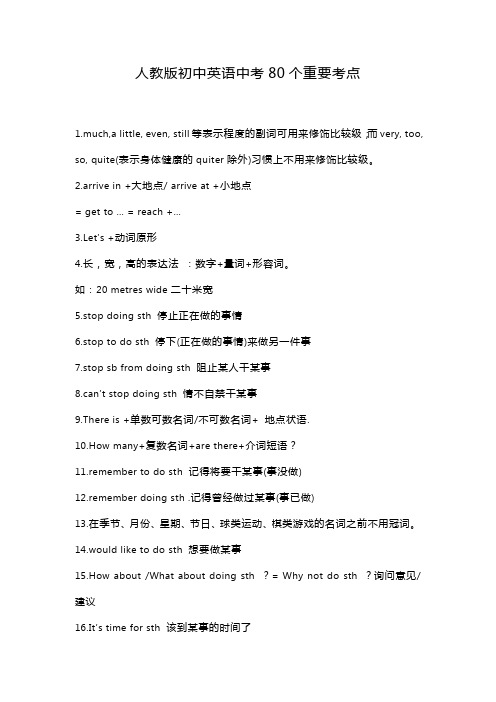
人教版初中英语中考80个重要考点1.much,a little, even, still等表示程度的副词可用来修饰比较级;而very, too, so, quite(表示身体健康的quiter除外)习惯上不用来修饰比较级。
2.arrive in +大地点/ arrive at +小地点= get to … = reach +…3.Let’s +动词原形4.长,宽,高的表达法:数字+量词+形容词。
如:20 metres wide二十米宽5.stop doing sth 停止正在做的事情6.stop to do sth 停下(正在做的事情)来做另一件事7.stop sb from doing sth 阻止某人干某事8.can’t stop doing sth 情不自禁干某事9.There is +单数可数名词/不可数名词+ 地点状语.10.How many+复数名词+are there+介词短语?11.remember to do sth 记得将要干某事(事没做)12.remember doing sth .记得曾经做过某事(事已做)13.在季节、月份、星期、节日、球类运动、棋类游戏的名词之前不用冠词。
14.would like to do sth 想要做某事15.How about /What about doing sth ?= Why not do sth ?询问意见/建议16.It’s time for sth 该到某事的时间了17.It’s time to do sth该到干某事的时间了18.have fun doing sth 很高兴干某事19.make sb do sth 使某人干某事20.can’t afford to do sth 没有足够多钱干某事21.can’t stand doing sth 不能忍受干某事22.mind doing sth 介意干某事23.try to do sth 尽力干某事24.finish doing sth 结束干某事25.decide to do sth 决定干某事26.plan to do sth 计划干某事27.It +takes +sb.+时间+to do sth28.sb. +spend +时间+on sth (in doing sth )29.Can you do sth ?你可以做,,,吗30.be busy doing sth 忙于干某事31.called = named = with the name (of)32.at the age of = when sb was/ were ….33.because of 后面接名词、代词、名词性短语、what从句34.keep doing sth . 表示不间断地持续做某事或一直做某事。
初中英语中考考点大汇总
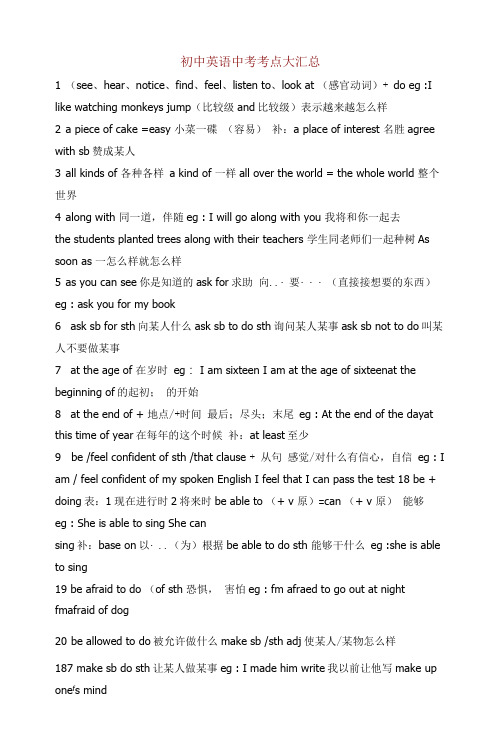
初中英语中考考点大汇总1(see、hear、notice、find、feel、listen to、look at (感官动词)+ do eg :I like watching monkeys jump(比较级and比较级)表示越来越怎么样2a piece of cake =easy 小菜一碟(容易)补:a place of interest 名胜agree with sb赞成某人3all kinds of 各种各样a kind of 一样all over the world = the whole world 整个世界4along with 同一道,伴随eg : I will go along with you 我将和你一起去the students planted trees along with their teachers 学生同老师们一起种树As soon as 一怎么样就怎么样5as you can see你是知道的ask for求助向..・要・・・(直接接想要的东西)eg : ask you for my book6ask sb for sth向某人什么ask sb to do sth询问某人某事ask sb not to do叫某人不要做某事7at the age of 在岁时eg: I am sixteen I am at the age of sixteenat the beginning of的起初;的开始8at the end of + 地点/+时间最后;尽头;末尾eg : At the end of the dayat this time of year在每年的这个时候补:at least至少9be /feel confident of sth /that clause + 从句感觉/对什么有信心,自信eg : I am / feel confident of my spoken English I feel that I can pass the test 18 be + doing表:1现在进行时2将来时be able to (+ v 原)=can (+ v 原)能够eg : She is able to sing She cansing补:base on以・..(为)根据be able to do sth 能够干什么eg :she is able to sing19be afraid to do (of sth 恐惧,害怕eg : fm afraed to go out at night fmafraid of dog20be allowed to do被允许做什么make sb /sth adj使某人/某物怎么样187make sb do sth让某人做某事eg : I made him write我以前让他写make up one f s mind188make...difference to...189mind sb to do mind one's doing 介意做什么most 十名most of + 代190much too + 形容词must be 一定191need +名词need sb do sth需要某人做某事192need to do (实义动词)need do (情态动词)no /neithr of hate to do no /neithr of hate doing193no +名词not anymore = no more 再也不eg: He didn't cry any more He cried nomore他再也不哭not...(形、副)at all eg: He's not tall at all she doesn't junp far at all194not...at all 一点都不not only... but also...不但…而且…not...either 表否定,也不eg : I don't japanse either I don't have sister; either我也没有姐姐195not...until 直到才eg: I didn't sleep until my mother came back The child didn't stop crying until I give her sugar196offer / provide sb with sth 给某人提供offer sb sth ( offer sth to sb 提供什么东西给某人eg : I offer you water (I offer water to you我给你提供水197on one's way to...在谁去那的路上on the one hand 一方面on the other hand 另一方面198on the phone = over the phone 用电话交谈on time 准时in time 及时199one day =some day = someday 一天,有一天one of +可数名词的复数形式200one to another 一个到另一个over and over agin 一遍又一遍的eg : He cleaned the floor over and over agin201part-time job 兼职工作fall-time job 全职工作pay for...付......钱pay the bill 开钱,付钱202please +do pull...up from...把..・从・..拉上来please help yourself203pleased with sbpool into = pore into204practice +doing 练习做某事prefer sth to sth 相对更喜欢eg : I preferphysics to chemisty 在物理和化学中,我更喜欢物理prefer doing to sth更喜欢去做..,不愿意去做.・・eg: He prefers riding a bike todiving他更喜欢骑自行车,不开小车prefer to do sth rather than do sth 宁愿做…也不愿eg: My unde prefers to buy a now car rather than repaiv the used one 我叔叔更喜欢买新的车,也不去修旧车prefer sb not to do sth 更愿意...eg: I prefer her not to come 我不喜欢她不来205pretend to do sth 装着去做什么pretend that 从句eg : The two cheats pretended to be working very hard 这两个骗子装着努力工作He pretended that he did not know the answer 他装着不知道答案rather...than 宁可也不eg : I would rather be a doctor than a teacher 我愿肯当医生,也不当老师He likes dogs rather than cats 他喜欢狗,不喜欢猫225 regard...as 把当作eg: Please give my best regards to your family请带我向你的家人我最好的问候I regard you as my friend我把你当作我的朋友He shows little regard for others 他不爱关心别人226 remid sb about sth提醒某人什么事remid sb to do sth提醒某人做某事eg : he remids me about cooking (he remids me to cook 他提醒我做饭227 remid sb of sth使某人想起什么eg : the pictures remind me of my school days 这照片使我想起了我的学校the words that (which) the teacher talke to remind me of my mother228 return sth to sb还什么东西给某人229 say to oneself 对自己说230 say to sb对某人说231 sb spend somemoney on sth 花了多少钱在某事上232 sb spend sometime with sb 花了多少时间陪谁233 sb spend sometime(in) doing sth 花了多少时间做某事234 sb with sb +is sband sb +are235 see sb do看见某人做过某事see sb doing看见某人正在做某事236 seem to do/be +adj 显得怎么样eg : You seem to be tired You seem to be happy it seem that237 send +sb sth送给某人某物238 send…to…把什么寄到哪里去?239 shock 使震惊eg : Oh , IVs only you ! You give me a shock 啊,是你呀!吓我一跳show sb sth 向某人展示某物 eg : I show her the book.240show sb sth = show sth to sb 拿什么东西给某人看eg: Show me your pen Show your pen to meshow sth to sb 向某人展示某物eg : I show the book to her.241some...others... 一些另一些start...with...从开始begin...with...从开始242stay away from 远离start doing sth/start to dosth 开始做某事eg : We1 re told to stay away from the animals whe visiting the zoo 当我们参观zoo时、我们要远离动物If you want to lose weight you'd better stay auay from the sweet food 徒工你想减肥,你最好远离甜食stop doing停下正在做的事243stop sb from doing sth阻止某人做某事stop sb(from) doing阻止某人做某事244stop to do停下正在做的事去做下一件事such +名这样,这种245suit sb适合某人surprise sb 使某人惊奇to one's surprise 令某人惊奇246take classes 上课take one's temperature 给某人量体温take sb to 把某人带去eg : I take you to the hospital247take walks = take a walk = go for a walk 散步①talk to 对谁说eg : I talk to you ② talk with 和谁说eg : I talk with him③ talk of 谈到eg : we talked of you ④ talk about 谈论关于257 talk with sb和某人说话258 teach sb sth教某人做某事tell sb do sth告诉某人做某事259tell sb sth tell sb that 丛句tell sb not to do sth tell a storytell sb sth告诉某人某事260tell sb to do sth告诉某人做什么tell sb not to do sth告诉某人不要做什么tell...from... thank to 幸亏,由于261thank you for +doing thank sb for sth 因某事而感谢某人the same + 名词(doing)+asthe more... the more...越..,就越..・262the same...(名)...as as...(adj adv)...as 相同the way to do sth=the way of doing sth 做某方面的方法the day before yesterday前天the way to +地方去哪的路e g : Do you know the way to learn EnglishDo you know the way of learning English263the way to…(地点)到哪的路269 too...to...太怎样而不能adj +enough to 足够..・能・・.so...that +丛句太… 所以…(such+名词…that+从句)eg: He is too young to go to school = He is so young that he cant go to school He is old enough to go to school = He is so old that he can go to school270 transalteinto 把什么翻译成什么eg : Trasalte English into Chinese271 travel with sb和某人去旅游272 try one's best to do sth尽某人最大的努力去做某事eg: I w川try my best to learn English well273 try to do sth想干什么,但没成功try doing sth想干什么,已经做过了eg : He tried to climb他想爬上去,但没成功He tried climbing他想爬上去,已经做过了274 try…试衣服have a try试一下275 turn down 开小 <—turn up 开大276 turn off 关上—turn on 打开open 拆开277 upside down 但J着nuless=if not278 visit to...参观某个地方279 wait for sb 等某人280 wait for sb to do sth 等某人做什么wait for sb 等某人wait for sometime 等多少间eg : Would you please wait for me to get ready 等我准备好,好吗?Let's wait for the rain to stop 让我们等雨停吧281 wake sb up把某人叫醒282 want to do sth想做某事283 watch sb do sth观看某人做某事补:wear out把…穿坏284 welcome to +…(地方)欢迎到285 what about +n /doing eg : what about an apple286 what if如果怎么办What if +句子eg : What if it is true ?如果是真的怎么办?What if aliens should come to the earth假如外星人来到地球怎么办?287 what they will do = what to do288 What's the matter ? = WhaVs the trouble ? = Whafs wrong ?有什么困难?289 while +延续性动词290 why don't you do = why not do291 will you please do will you please not do292 with one's best = with the help of sb 在某人的帮助下293 with the help of sb 在某人的帮助下with one f s help294 work at…在某处工作295 work with sb和某人一起工作296 would like sth /to do sth eg : I would like to go to LuZhou297 would you please +do 298 yet :至今,用在否定句中299 you'd better do最好做某事=you'd better not do最好不要做某事300不定式+v(原)301联系动词(taste吃起来/sound听起来/look看起来/semll闻起来)+adj302名词、副词、形容词修饰enongh时,形容词放在之前,名词副词放在之后303太多too much +不可数too many +可数much too相当于very ,修饰形容词304向宾语提问:Whom 305向地点提问:Where 306向方式提问:How307向价格和不可数名词提问:How much 308向可数名词提问:How many309向频率提问:How often 310向时间段提问:How long311向时间提问:what time/when 312向物主代词提问:Whose313向职业提问:what do/does……do 314向主语提问:Who315在将来时中,……以后(用in, 一般时态中,……以后(用after316.It's time for sth.该到做某事的时间了 . It's time to do sth.(Its time for sb. todo sth)该到(某人)做某事的时间了.317.can't wait to do sth.迫不及待地要求做某事.318.ask (tell)sb. (not )to do sth .请(告诉)某人(不)做某事.319.make/let sb. to do sth.让某人做某事.320.hear/see/sb. do sth听见/看见某人做某事.321.had better(not )do sth 最好不做某事.322.Its better to do sth 最好做某事It's best to do sth 最好做某事323.enjoy喜欢做某事finish结束做某事324.keep继续做某事keep on doing sth.继续做某事325.carry on继续做某事go on继续做某事326.feel like喜欢做某事stop to do sth与stop doing sth停下来去做某事(与)停止做某事.327.forget/remember to do 与forget/「emember doing sth,忘t己/,己得去做某事(与)忘记/记得曾经做过事.328.keep(precent,stop)sb. from doing sth 阻止/防止/阻栏栽人做某事prefer....to喜欢・・・,.胜过329.prefer to do sth. rather than do ath,宁愿做某事,而不原做某事.ed to do sth.过去常常做某事.331.What's wong with? .・…出了问题(事)?332.have nothing to do with.・...与...一无关be busy doing sth .在忙于做某事333.tooto.・・・・太・・・・・・以致知于不・・・・・・so ......that.....如此.....以致知于不......334.such.・・・.that如此以致知于不It take sb. some time to do sth ,某人做某事用了一些时间.335.spend .・・・,on sth.(doing sth)花钱/时间做某事.336.pay.….for sth.花费(钱)买某物.337.What /how about……?…,…怎么样(好吗)?338.would like to do sth .想要/愿意做某事..339.I don't think that 我认为不・・・,,Why not do sth.? Why don't you do sth ・为什么不做某事呢340.What do you mean by.…你.…是什么意思?341.What do you think of (How do you like .・・.)你认为・・.,怎么样?342.Mike enjoys collecting stamps . So do L迈克喜欢集邮,我也也喜欢.343.The more, the better,越多越剧好.344.Thanks for doing sth•谢谢你做了某事.345.It is said that..… 据说…356,感官动词see, watch, observe, notice, look at, hear; listen to, smell, taste, feel + do 表示动作的完整性,真实性;+doing表示动作的连续性,进行性,I saw him work in the garden yesterday,昨天我看见他在花园里干活了。
中考英语总复习分册知识点考点归纳总结
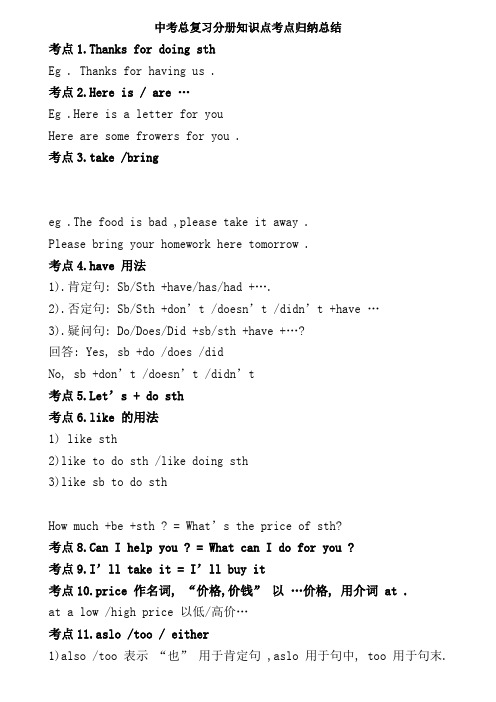
中考总复习分册知识点考点归纳总结考点1.Thanks for doing sthEg . Thanks for having us .考点2.Here is / are …Eg .Here is a letter for youHere are some frowers for you .考点3.take /bringeg .The food is bad ,please take it away .Please bring your homework here tomorrow .考点4.have 用法1).肯定句: Sb/Sth +have/has/had +….2).否定句: Sb/Sth +don’t /doesn’t /didn’t +have …3).疑问句: Do/Does/Did +sb/sth +have +…?回答: Yes, sb +do /does /didNo, sb +don’t /doesn’t /didn’t考点5.Let’s + do sth考点6.like 的用法1) like sth2)like to do sth /like doing sth3)like sb to do sthHow much +be +sth ? = What’s the price of sth?考点8.Can I help you ? = What can I do for you ?考点9.I’ll take it = I’ll buy it考点10.price 作名词, “价格,价钱” 以…价格, 用介词 at .at a low /high price 以低/高价…考点11.aslo /too / either1)also /too 表示“也” 用于肯定句 ,aslo 用于句中, too 用于句末.2)either 用于否定句的句末.考点12.询问sb 的生日是什么时候?When is one’s birthday ? It’s ….考点13.want 用法1)want sth2)want to do sth = would like to do sth = feel like doing sth3)want sb to do sth考点14.and / or /but 区别1)and /or 表示“并列”用法区别and 表示“并列”用于肯定句, 否定句或疑问句用or注:在否定句中并列成分用or 连接,若用and则重复使用前面的否定词.Eg .I don’t like white or black .I have no books and no pens.2).and /butand 表“并列” 而but 表“转折”考点15.think 用法Sb +think +主语+谓语注: 否定前移考点16.play 的用法1)play 及乐器连用,乐器前一定加定冠词the3)play with … 及……玩/玩耍考点17.Can you +动词原形 ? 回答: Yes, I can / No ,I can’t .考点18.句型: May I know / have your name ?考点19.同义句: What’s your favorite subject ?= What subj ect do you like best ?考点20.同义句: take a bus to … = go to …by bus .考点21.询问职业:1)What do /does sb do ?2)What’s one’s job ?3)What + be +sb ?考点22.询问爱好:What +be +one’s +hobby/hobbies ?考点23.help 的用法1) help sb with sth2)help sb do /to do sth3)help do sth4) can’t help doing sth考点24.what time /when1) what time 常用来问钟点2)when 既可以问钟点(这时what time =when ),也可问日期,月份,年份,…..ago. (这时what time ≠when )考点25.How many/How much 的区别1)How many +名词的复数+一般疑问句?2)How much +不可数名词+一般疑问句?3) How much +be + 名词? 询问价格考点26.listen / hear/hear about 的区别1)listen to “听……” 指努力地听…… 强调“听”的过程.2)hear 听到/见 ,强调“听”的结果3)hear about /of 听说, 强调间接地听到考点27.look /wacth /see/read 的区别1)look “看” 指看一看,不管结果如何,强调看的动作,后接宾语时常代at2)watch “看,观看” 特别留意……, 感兴趣地看运动着的东西.3)see “看到/见” 强调看的结果,有意或无意地看到, 无进行时.4)read “看书籍之类”考点28.Excuse me /sorry 的区别1)Excuse me 常用来事前请别人帮忙,或会打扰别人的情况.2)Sorry /I’m sorry “对不起,抱歉”,一般用于事后对所犯错误或不能满足对方的要求等表示歉意.七年级下考点归纳考点e from = be from注: Where do /does sb come from ? =Where be sb from ?What language do /does sb speak ?Sb speak(s) …考点3.dislike = not like = hate考点4. There be 句型归纳There be 句型1). 定义:There be句型表示某处存在某物或某人。
中考英语考点归纳(全)
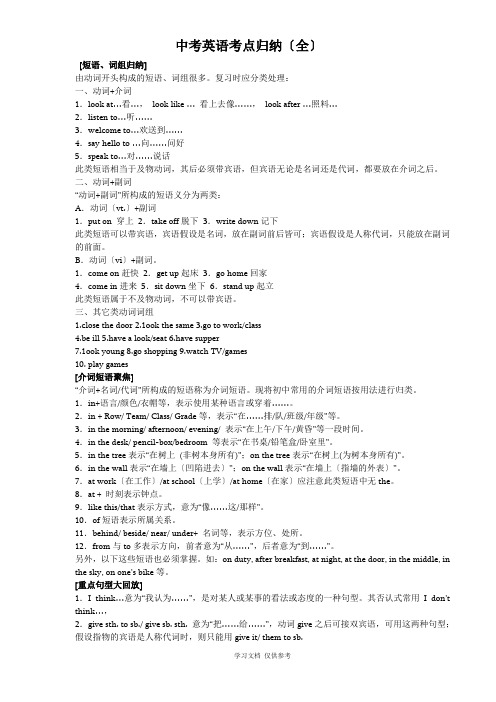
中考英语考点归纳〔全〕[短语、词组归纳]由动词开头构成的短语、词组很多。
复习时应分类处理:一、动词+介词1.look at…看…,look like … 看上去像……,look after …照料…2.listen to…听……3.welcome to…欢送到……4.say hello to …向……问好5.speak to…对……说话此类短语相当于及物动词,其后必须带宾语,但宾语无论是名词还是代词,都要放在介词之后。
二、动词+副词“动词+副词”所构成的短语义分为两类:A.动词〔vt.〕+副词1.put on 穿上2.take off脱下3.write down记下此类短语可以带宾语,宾语假设是名词,放在副词前后皆可;宾语假设是人称代词,只能放在副词的前面。
B.动词〔vi〕+副词。
1.come on赶快2.get up起床3.go home回家4.come in进来5.sit down坐下6.stand up起立此类短语属于不及物动词,不可以带宾语。
三、其它类动词词组1.close the door2.1ook the same3.go to work/class4.be ill5.have a look/seat6.have supper7.1ook young 8.go shopping 9.watch TV/games10. play games[介词短语聚焦]“介词+名词/代词”所构成的短语称为介词短语。
现将初中常用的介词短语按用法进行归类。
1.in+语言/颜色/衣帽等,表示使用某种语言或穿着……。
2.in + Row/ Team/ Class/ Grade等,表示“在……排/队/班级/年级”等。
3.in the morning/ afternoon/ evening/ 表示“在上午/下午/黄昏”等一段时间。
4.in the desk/ pencil-box/bedroom 等表示“在书桌/铅笔盒/卧室里”。
初中英语中考高频考点983个核心单词(覆盖初中全部单词)
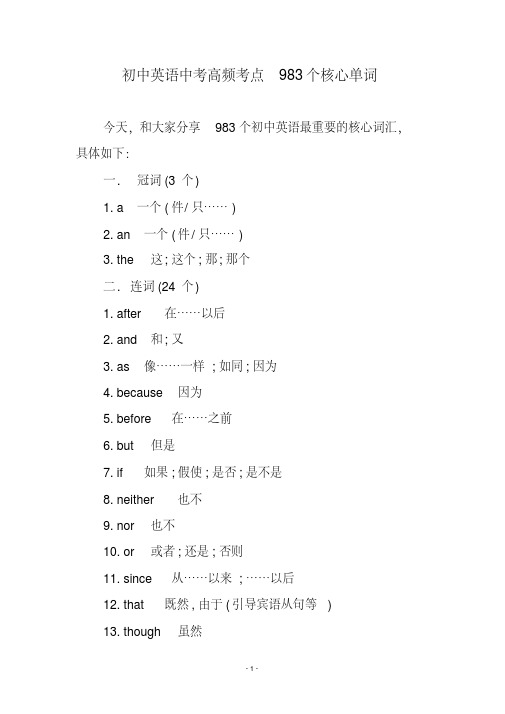
初中英语中考高频考点983个核心单词今天,和大家分享983个初中英语最重要的核心词汇,具体如下:一. 冠词(3个)1. a 一个(件/只……)2. an 一个(件/只……)3. the 这;这个;那;那个二. 连词(24个)1. after 在……以后2. and 和;又3. as 像……一样;如同;因为4. because 因为5. before 在……之前6. but 但是7. if 如果;假使;是否;是不是8. neither 也不9. nor 也不10. or 或者;还是;否则11. since 从……以来;……以后12. that 既然,由于(引导宾语从句等)13. though 虽然14. till 直到;直到……为止15. until 直到;直到……为止16. when 当……的时候17. whether 是否18. while 在/当……的时候;和……同时19. than 比20. so 因此;所以21. both…and…两个都;既……又……22. not only…but also…不但……而且……23. either…or…或者……或者……;不是……就是……24. neither…nor…既不……也不……三. 介词(37个)1. about 在各处;四处;关于2. after 在……之后;在……后面3. along 沿着;顺着4. as 作为;当作5. among 在……中间;在(三者或三者以上)之间6. at (表示地点/位置)在;(表示时间)在……时(刻);(表示动作的目标和方向)7. before 在……前面;在……以前8. behind 在……后面9. below 在……下面10. beside 在……旁边;靠近11. between 在(两者) 之间;在……中间12. by 在……旁边;靠近;(指时间)不迟于;(用于被动语态) 被(表示方法、手段) 用; 由(指交通工具等) 乘13. down 沿着(街道、河流)而下14. during 在……的期间;在……过程中15. except 除……之外16. for (表示方向)往;(表示所属) ……的;(说明目的或用途) 为…17. from (表示起点) 从;(表示开始的时候)从……起;(表示距离)距;(表示来源) 来自18. in front of 在……前面19. into (表示动作的方向)到……内;(表示情况和结果的变化)变成20. in (表示位置)在…里/内/中;在…(时间);穿;戴在…(情况/状况)中;使用(语言)21. like 像22. near 在……附近;靠近24. off (表示脱离)离开23. of (表示所属关系)…的;表示数量)…的;(表示其中)…的25. on 在……上面;在……时刻;关于26. over 在……上方(以上);越过;遍及27. past (指时间)过;走过某处28. since 自从…以来29. through 穿过;通过;从开始到结束30. till 直到……为止31. until 直到……为止32. up 在/向……上面33. to (表示方向) 到,向;(表示间接关系) 给; (表示钟点) 在……之前34. with (表示具有) 带有;(表示手段或方法)用;(表示伴随) 与…一道;和…一起35. without 没有36. round 环绕一周;围着37. under 在/向……下面四. 代词(40个)1. 人称代词(8对)我 I / me你 you / you他 he / him她 she / her它 it / it我们 we / us你们 you / you他/她/它们 they / them2. 物主代词(8对)我的 my / mine你的 your / yours他的 his / his她的 her / hers它的 its / its我们的 our / ours你们的 your / yours他/她/它们的 their / theirs 3. 反身代词(6个)我自己 myself你自己 yourself他自己 himself她自己 herself它自己 itself我们自己 ourselves你们自己 yourselves他/她/它们自己 themselves 五. 数词(64个)1. 基数词(32个)1. one2. two3. three4. four5. five6. six7. seven8. eight9. nine10. ten11. eleven12. twelve13. thirteen14. fourteen15. fifteen16. sixteen17. seventeen18. eighteen19. nineteen20. twenty21. twenty-one30. thirty40. forty50. fifty60. sixty70. seventy80. eighty90. ninety100. a hundred123. a hundred and twenty-three 1,000. a thousand1,000,000. a million2. 序数词(32个)第一 first第二 second第三 third第四 fourth第五 fifth第六 sixth第七 seventh第八 eighth第九 ninth第十 tenth第十一 eleventh第十二 twelfth第十三 thirteenth第十四 fourteenth第十五 fifteenth第十六 sixteenth第十七 seventeenth第十八 eighteenth第十九 nineteenth第二十 twentieth第二十一 twenty-first第三十 thirtieth第四十 fortieth第五十 fiftieth第六十 sixtieth第七十 seventieth第八十 eightieth第九十 ninetieth第一百 a hundredth第一百二十三 a hundred and twenty-third 第一千 a thousandth第一百万 a millionth六. 形容词(151个)1. able 能够;有能力的2. above 上面的3. afraid 害怕的;担心的4. alone 单独的5. all 全部;所有的6. angry 生气的;愤怒的7. another 再一;另一8. any 一些;任何的9. bad 坏的;严重的10. beautiful 美丽的11. big 大的12. black 黑色的13. blue 蓝色的14. both 两;双15. bright 明亮的;聪明的16. brown 棕(褐)色的17. busy 忙的;忙碌的18. careful 小心的;仔细的19. cheap 便宜的20. clean 干净的;清洁的21. clear 清晰的;清楚的22. close 近的;靠近的23. cloudy 多云的24. cold 冷的;寒冷的25. cool 凉的;凉快的26. dangerous 危险的27. dark 黑暗的;深色的28. dead 死的29. dear 亲爱的;贵的30. deep 深的31. delicious 美味的;可口的32. different 不同的;差异的33. difficult 困难的;艰难的34. dirty 脏的35. dry 干的;干燥的36. early 早的37. east 东方的38. easy 容易的39. either (两者中)任何一方的40. empty 空的41. enough 足够的;充分的42. every 每一;每个的43. expensive 昂贵的。
初中中考英语知识点考点总结
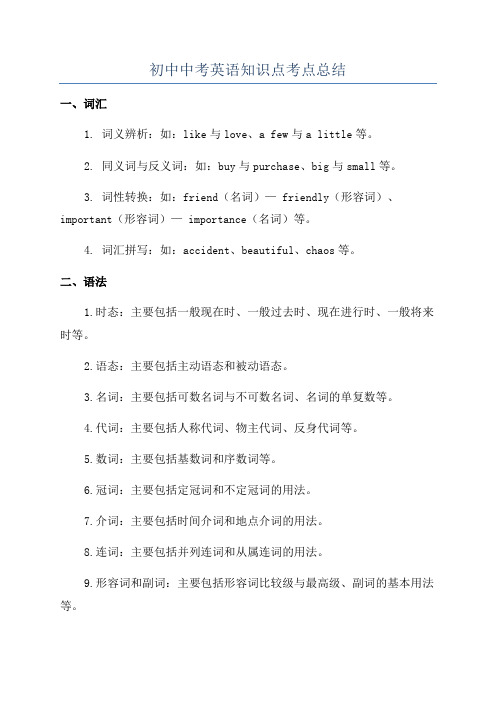
初中中考英语知识点考点总结一、词汇1. 词义辨析:如:like与love、a few与a little等。
2. 同义词与反义词:如:buy与purchase、big与small等。
3. 词性转换:如:friend(名词)— friendly(形容词)、important(形容词)— importance(名词)等。
4. 词汇拼写:如:accident、beautiful、chaos等。
二、语法1.时态:主要包括一般现在时、一般过去时、现在进行时、一般将来时等。
2.语态:主要包括主动语态和被动语态。
3.名词:主要包括可数名词与不可数名词、名词的单复数等。
4.代词:主要包括人称代词、物主代词、反身代词等。
5.数词:主要包括基数词和序数词等。
6.冠词:主要包括定冠词和不定冠词的用法。
7.介词:主要包括时间介词和地点介词的用法。
8.连词:主要包括并列连词和从属连词的用法。
9.形容词和副词:主要包括形容词比较级与最高级、副词的基本用法等。
10.动词:主要包括动词的基本形式、动词的否定形式和疑问形式等。
11.句子成分:主要包括主语、谓语、宾语、表语、宾补等。
三、阅读理解1.主旨大意:通过阅读理解文章找出文章的主旨大意。
2.细节理解:通过阅读理解文章理解文章中的细节信息。
3.推理判断:通过阅读理解文章推理出一些信息。
4.阅读策略:通过对阅读理解文章的整体结构和段落结构的理解来解答问题。
5.文章类型:通过阅读理解文章分析文章的类型。
四、短语和固定搭配1. 动词短语:如:get up、take off、look after等。
2. 名词短语:如:a piece of cake、at first、by the way等。
3. 动宾搭配:如:do homework、take photos、make a decision等。
5. 副词短语:如:once a week、twice a month等。
五、写作技巧1.书信:主要包括信件的格式和常用写作句式。
初三英语全部知识点总结_中考英语
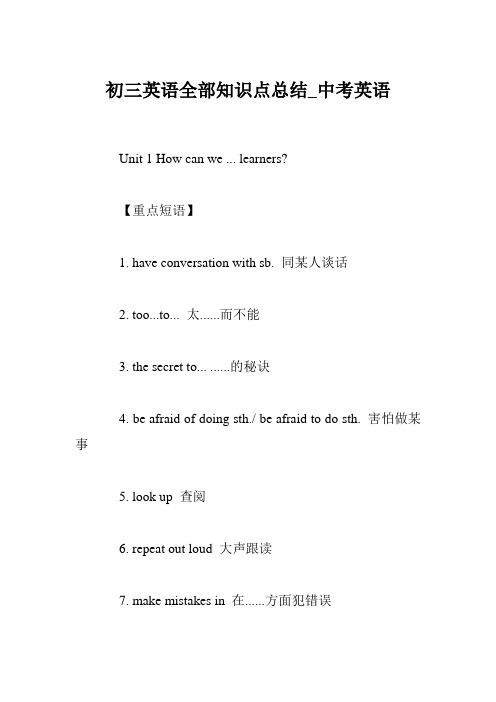
初三英语全部知识点总结_中考英语Unit 1 How can we ... learners?【重点短语】1. have conversation with sb. 同某人谈话2. too...to... 太......而不能3. the secret to... ......的秘诀4. be afraid of doing sth./ be afraid to do sth. 害怕做某事5. look up 查阅6. repeat out loud 大声跟读7. make mistakes in 在......方面犯错误8. connect ......with... 把......和......连接/联系起来9. get bored 感到厌烦10. be stressed out 焦虑不安的11. pay attention to 注意;关注12. depend on 取决于;依靠13. the ability to do sth.. 做某事的能力【考点详解】1. by + doing 通过......方式(by是介词,后面要跟动名词,也就是动词的ing形式)2. talk about 谈论,议论,讨论The students often talk about movie after class. 学生们常常在课后讨论电影。
talk to sb= talk with sb 与某人说话3. 提建议的句子:①What/ how about +doing sth.? 做...怎么样?(about 后面要用动词的ing形式,这一点考试考的比较多)如:What/ How about going shopping?②Why don't you + do sth.? 你为什么不做...?如:Why don't you go shopping?③Why not + do sth. ? 为什么不做...?如:Why not go shopping?④Let's + do sth. 让我们做......吧。
人教九年级全册英语语法考点总结,中考必备知识点

人教九年级英语语法考点总结,中考必备知识点一. 介词by的用法1. 意为“在……旁”,“靠近”。
Some are singing and dancing under a big tree. Some are drawing by the lake.有的在大树下唱歌跳舞。
有的在湖边画画儿。
2. 意为“不迟于”,“到……时为止”。
Your son will be all right by supper time.你的儿子在晚饭前会好的。
How many English songs had you learned by the end of last term?到上个学期末你们已经学了多少首英语歌曲?3. 表示方法、手段,可译作“靠”、“用”、“凭借”、“通过”、“乘坐”等。
The monkey was hanging from the tree by his tail and laughing.猴子用尾巴吊在树上哈哈大笑。
The boy’s father was so thankful that he taught Edison how to send messages by railway telegraph. 孩子的父亲是那么的感激,于是他教爱迪生怎样通过铁路电报来传达信息。
4. 表示“逐个”,“逐批”的意思。
One by one they went past the table in the dark.他们一个一个得在黑暗中经过这张桌子。
5. 表示“根据”,“按照”的意思。
What time is it by your watch?你的表几点了?6. 和take , hold等动词连用,说明接触身体的某一部分。
I took him by the hand.我拉住了他的手。
7. 用于被动句中,表示行为主体,常译作“被”、“由”等。
English is spoken by many people.英语被许多人说。
初中英语2024届中考考点清单(代词+连词+形容词+数词+介词)
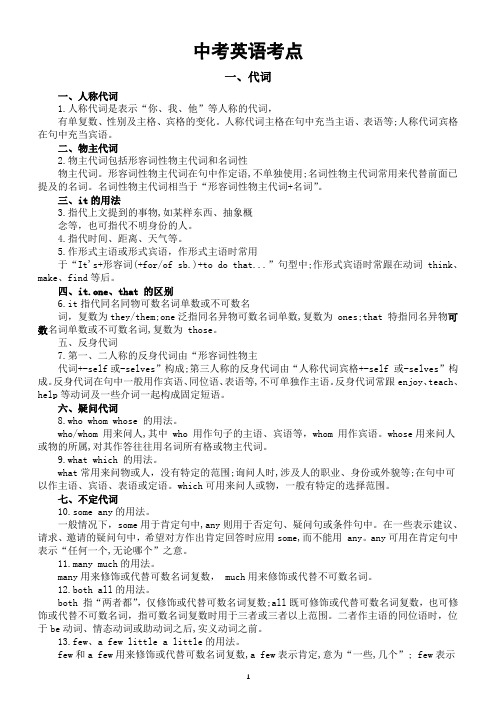
中考英语考点一、代词一、人称代词1.人称代词是表示“你、我、他”等人称的代词,有单复数、性别及主格、宾格的变化。
人称代词主格在句中充当主语、表语等;人称代词宾格在句中充当宾语。
二、物主代词2.物主代词包括形容词性物主代词和名词性物主代词。
形容词性物主代词在句中作定语,不单独使用;名词性物主代词常用来代替前面已提及的名词。
名词性物主代词相当于“形容词性物主代词+名词”。
三、it的用法3.指代上文提到的事物,如某样东西、抽象概念等,也可指代不明身份的人。
4.指代时间、距离、天气等。
5.作形式主语或形式宾语,作形式主语时常用于“It's+形容词(+for/of sb.)+to do that...”句型中;作形式宾语时常跟在动词 think、make、find等后。
四、it.one、that 的区别6.it指代同名同物可数名词单数或不可数名词,复数为they/them;one泛指同名异物可数名词单数,复数为 ones;that 特指同名异物可数名词单数或不可数名词,复数为 those。
五、反身代词7.第一、二人称的反身代词由“形容词性物主代词+-self或-selves”构成;第三人称的反身代词由“人称代词宾格+-self 或-selves”构成。
反身代词在句中一般用作宾语、同位语、表语等,不可单独作主语。
反身代词常跟enjoy、teach、help等动词及一些介词一起构成固定短语。
六、疑问代词8.who whom whose 的用法。
who/whom 用来问人,其中 who 用作句子的主语、宾语等,whom 用作宾语。
whose用来问人或物的所属,对其作答往往用名词所有格或物主代词。
9.what which 的用法。
what常用来问物或人,没有特定的范围;询问人时,涉及人的职业、身份或外貌等;在句中可以作主语、宾语、表语或定语。
which可用来问人或物,一般有特定的选择范围。
七、不定代词10.some any的用法。
- 1、下载文档前请自行甄别文档内容的完整性,平台不提供额外的编辑、内容补充、找答案等附加服务。
- 2、"仅部分预览"的文档,不可在线预览部分如存在完整性等问题,可反馈申请退款(可完整预览的文档不适用该条件!)。
- 3、如文档侵犯您的权益,请联系客服反馈,我们会尽快为您处理(人工客服工作时间:9:00-18:30)。
初中中考英语知识点考点总结一.修饰比较级时常见的错误1. more不可修饰比较级,但much可以用来加强比较级,意为"……的多,更……" He looks more younger than I. (×)He looks much younger than I. (√ )2. 比较的对象或范围出现错误。
1)The weather of Beijing is colder than Shanghai. (×)(比较的对象应该是上海的天气,而不是上海)The weather of Beijing is colder than that of Shanghai. (√)2)China is larger than any country in Asia. (×)(出现了逻辑上的错误: 中国就是亚洲国家,应当排除在外。
)China is larger than any country in Africa. (√)中国比非洲的任何国家都大。
China is larger than any other country in Asia. (√)中国比亚洲的任何(其他的)国家都大。
特别提示Than后面接代词时,一般要用主格,但在口语中也可使用宾格。
如果than后是一个句子,则不可使用宾格。
He works harder than me.He works harder than I do.二.形容词的比较级用于两者比较,表示"比…更…":"A+系动词+形容词比较级+than+ B,e.g. I am two years older than my little sister."A+谓语动词+副词比较级+than+ B:e.g. She gets to school earlier than the other students."比较级+and+比较级",这种结构表示事物本身程度的逐渐增长,意为"越来越…"。
eg. In spring the days are getting longer and longer."the+比较级…the+比较级",表示一方的程度随着另一方的程度的增长而增长,表示"越…,越…"。
eg. The mort you practice using English,the better you'll learn it 你英语练得越多,就会学得越好。
"A十动词十the+比较级+of短语(比较范围)",这种结构表示"两者中更……的那一个"。
当比较双方只出现一方(没有than及其后面的部分),且句中含有of the two……时,比较级前要加the.eg. Penny is the taller of the two girls.The larger of the two houses belongs to Mr. Black.表示两者程度不同的其他方式可用more than(多于……),not more than(不多于……),less than(少于……),not less than(不少于……),less+形容词+ than(不如……)等。
We haven't got more than one hour left right now.It is less cold today than it was yesterday."not+比较级+than"与"no+比较级+than" 这两个结构表达的意思完全不同:前者往往表示"一方不比另一方……",后者往往表示"前者和后者一样都不…";修饰说明数量时,前者表示"最多,不比……多",后者表示"仅仅",带有感情色彩。
I am not taller than you. 我不比你高。
I am no taller than you. 我和你一样高。
My French is not better than yours.My French is no better than yours.She is not more than seven years old.She is no more than seven years old.三.形容词的最高级最高级是表示在三者或更多者中程度最高的比较方式the+ 形容词最高级+名词+表示范围的短语或从句Jack is the tallest student in his class.He is the fastest runner of the three boys.This is the most boring book I've ever read.one of the+形容词最高级+名词复数+表示范围的短语或从句China is one of the largest countries in the world.用法比较:介词in和of引导的短语说明比较的范围如果在一定的地域空间内进行比较用in; 如果在同一类事物范围内进行比较用of.China is the largest country in Asia.China is the largest one of all the Asian countries.运用比较级表达最高级的概念:"比较级+than any other+名词单数","比较级+than the other+名词复数"或"比较级+than the rest of +the+名词复数"Julia is taller than any other girl in her class.= Julia is taller than the other girls in her class. = Julia is taller than the rest of the girls in her class.四.表示移动方向的介词(1)to表示“向,往到”。
如:He will drive to Nanjing. 他将开车去南京。
(2) from表示“自,从,来自”。
如:Where are you from 你是哪儿人I am from Jiangsu Province. 我是江苏人。
(3)up表示“向……上,往上”。
如:Mr. Smith used a lift to go up and down. 史密斯先生乘电梯上下。
( 4)down表示“向……下,沿着……往下”。
如:Go down the street then you’ll find the shop. 沿着这条街走,你就会发现那个商店。
(5)round表示“环绕,围绕”如:The students are running round the playground. 学生们正绕着操场跑步。
(6)across表示“横过,穿过,跨过”。
如:A boy walked across the park just now. 一个男孩刚才穿过公园。
(7)through表示“通过,穿过(空间)”。
如:The river ran through the city. 那条河从城中流过。
(8)over表示“越过,从……上边过去”。
如:There is a bridge over the river. 河上有座桥。
五.相似介词组辨析1)貌似相同的in front of与in the front ofin front of“在......的前面”,指从外部看来一物在另一物的前面。
如:There’s a big tree in front of the building.in the front of“在......的前面”,指从内部看来一物在另一物的前部。
如:The driver sits in the front of the car.2)貌似相同的in time与on timein time意思是“及时”,指在时间上有提前、刚好的意思,表示正赶上时候或恰在需要的时候,作表语时常与for sth.或to do sth. 连用。
如:We’re just in time to catch the bus.on time意思是“按时、准时”,通常指有时间限制,以规定的时间为界,在规定时间内即为按时。
如:We should get to school on time.The train arrived on time.3)貌似相同的beside与besidesbeside表示位置,意思是“在......的旁边”,与by,at同意。
如:There is a big tree beside the house.besides意思是“除了......以外,还......”与except,but同义。
如:The girl is studying Japanese besides English.六.but:但是,可是,而He is old,but he looks very young.他老了,但他看起来很年轻。
Li Li likes violin but doesn't like piano.李莉喜欢小提琴,(但是)不喜欢钢琴。
(but 后面省略了主语Li Li,因为与前面的主语成分相同)Mary likes violin,but Tom doesn't.玛丽喜欢小提琴,而汤姆不喜欢。
(doesn't后面省略了like violin,因为与前面的成分相同)He isn't a teacher but a doctor.他不是(一个)老师,而是医生。
They came here not for money but for the life.他们到这儿来,不是要钱,而是要命。
注意:but所连接的句子,句中如果某些成分与前面相同,则可以省略。
七.or:或,或者,否则Is Li Ming from Beijing or from Shanghai.李明是北京人还是上海人呢?1.基本用法or表示“~或”的意思,使用于两者之中选择一个的时候。
Would you like coffee or tea?你喜欢咖啡还是茶?Tom or I am right.我或者汤姆是对的。
Li Ming or his classmates are cleaning the room.李明或者是他的同班同学在打扫房间。
